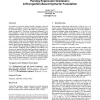Free Online Productivity Tools
i2Speak
i2Symbol
i2OCR
iTex2Img
iWeb2Print
iWeb2Shot
i2Type
iPdf2Split
iPdf2Merge
i2Bopomofo
i2Arabic
i2Style
i2Image
i2PDF
iLatex2Rtf
Sci2ools
110
click to vote
POPL
2004
ACM
2004
ACM
Parsing expression grammars: a recognition-based syntactic foundation
For decades we have been using Chomsky's generative system of grammars, particularly context-free grammars (CFGs) and regular expressions (REs), to express the syntax of programming languages and protocols. The power of generative grammars to express ambiguity is crucial to their original purpose of modelling natural languages, but this very power makes it unnecessarily difficult both to express and to parse machine-oriented languages using CFGs. Parsing Expression Grammars (PEGs) provide an alternative, recognition-based formal foundation for describing machineoriented syntax, which solves the ambiguity problem by not introducing ambiguity in the first place. Where CFGs express nondeterministic choice between alternatives, PEGs instead use prioritized choice. PEGs address frequently felt expressiveness limitations of CFGs and REs, simplifying syntax definitions and making it unnecessary to separate their lexical and hierarchical components. A linear-time parser can be built for ...
Minimal Recognition Schemas | POPL 2004 | Processors--Parsing General Terms | Programming Languages |
| Added | 03 Dec 2009 |
| Updated | 03 Dec 2009 |
| Type | Conference |
| Year | 2004 |
| Where | POPL |
| Authors | Bryan Ford |
Comments (0)

